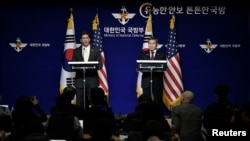South Korean and U.S. officials broke off talks on Tuesday aimed at settling the cost burden for Seoul of hosting the U.S. military, South Korea's Foreign Ministry said, amid a public backlash over a U.S. demand for a sharp increase in the bill.
Officials had resumed a planned two-day negotiation on Monday, trying to narrow a $4 billion gap in what they believe South Korea should contribute for the cost of stationing U.S. troops in the country for next year.
"Our position is that it should be within the mutually acceptable Special Measures Agreement (SMA) framework that has been agreed upon by South Korea and the U.S. for the past 28 years," South Korea's Foreign Ministry said, referring to the cost-sharing deal's official name.
"The U.S. believes that the share of defense spending should be increased significantly by creating a new category," the ministry said in a statement.
Negotiators left the table after only about one hour of discussions while the talks were scheduled throughout the day, South Korean media reported, citing unnamed foreign ministry officials.
South Korean lawmakers have said U.S. officials had demanded up to $5 billion a year, more than five times the 1.04 trillion won ($896 million) Seoul agreed to pay this year for hosting the 28,500 troops.
U.S. officials have not publicly confirmed the number, but Trump has previously said the U.S. military presence in and around South Korea was "$5 billion worth of protection."
The negotiations are taking place as U.S. efforts to reach an agreement with North Korea over its nuclear and missile programs appear stalled, ahead of a year-end deadline from Pyongyang for the U.S. to shift its approach.
Lee Hye-hoon, head of South Korea's parliamentary intelligence committee, said in a radio interview on Tuesday the U.S. ambassador to South Korea talked to her at length earlier this month about how Seoul had been only paying one-fifth what it should have been paying for the cost of stationing U.S. troops.
Under South Korean law, the military cost-sharing deal must be approved by parliament.
Ruling party lawmakers have said this week they will "refuse to ratify any excessive outcome of the current negotiations" that deviate from the established principle and structure of the agreements for about 30 years.
Trump has long railed against what he says are inadequate contributions from allies towards defense costs. The United States is due to begin separate negotiations for new defense cost-sharing deals with Japan, Germany and NATO next year.





